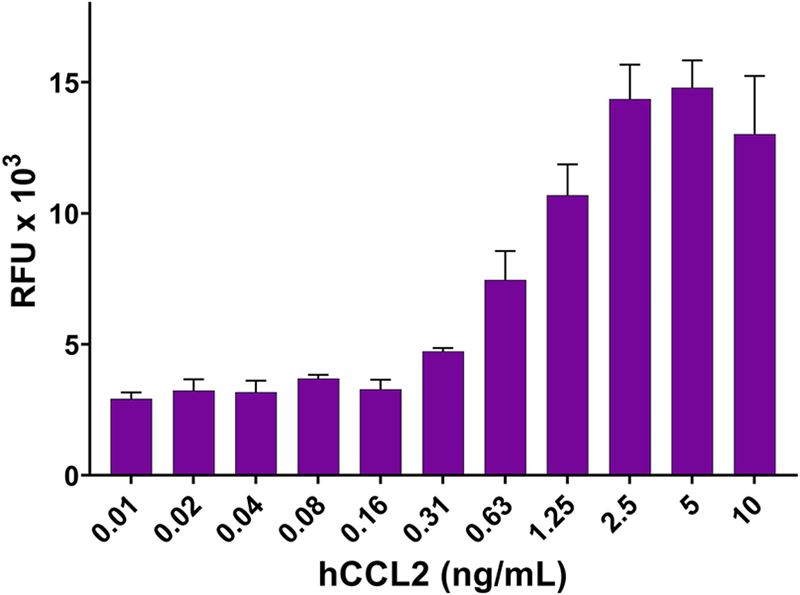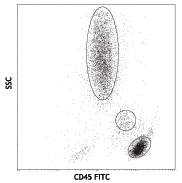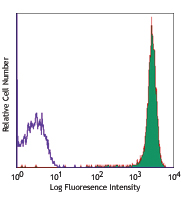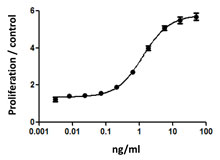- Regulatory Status
- RUO
- Other Names
- Nerve growth factor, NGF, beta-NGF
- Ave. Rating
- Submit a Review
- Product Citations
- publications
| Cat # | Size | Price | Quantity Check Availability | Save | ||
|---|---|---|---|---|---|---|
| 711906 | 100 µg | £174 | ||||
This product is not available for shipping outside of the United States.
β-NGF is a pluripotent mediator and it exists in many tissues. Secreted β-NGF can bind to tryosine kinase A receptor with higher affinity and to p75 (NTR) with low affinity. β-NGF is well known as an endogenous neurotrophic factor involved in the embryonal development, survival, and regeneration of mammalian sympathetic and sensory neurons. In adults, β-NGF is also involved in the survival and regeneration of neurons in the central nervous system. Involvement of β-NGF in the immune system has also been reported. In vitro cultured B lymphocyte can constitutively secret β-NGF, which can act as an autocrine growth and differentiation factor for B cells. β-NGF can also downregulate the production of IFN-γ by T cells. Recombinant β-NGF has been used in many clinical trials to treat different disease including Alzheimer's disease, diabetic polyneuropathy, and HIV-associated peripheral neuropathy.
Product DetailsProduct Details
- Source
- Human β-NGF, amino acids Ser122-Arg239 (Accession# NP_002497), was expressed in E. coli.
- Molecular Mass
- The 118 amino acid recombinant protein has a predicted molecular mass of approximately 13.5 kD. This protein is a disulfide-linked homodimer and the predicted molecular mass is 27 kD. The predicted N-terminal amino acid is Ser.
- Purity
- >98%, as determined by Coomassie stained SDS-PAGE and HPLC analysis.
- Formulation
- Lyophilized, carrier-free.
- Endotoxin Level
- Less than 0.1 ng per µg of protein.
- Concentration
- This product is bottled at the concentration indicated on the vial.
- Storage & Handling
- Unopened vial can be stored at -20°C or -70°C. For maximum results, quick spin vial prior to opening. Reconstitute in water to a concentration of 0.1-1.0 mg/ml. Do not vortex. It is recommended to further dilute in a buffer, such as 5% Trehalose, and store working aliquots at -20°C to -80°C. Avoid repeated freeze/thaw cycles.
- Activity
- Assay 1: Determined by the dose-dependent stimulation of the proliferation of human TF-1 cells. The expected ED50 is ≤ 1.0 ng/ml, corresponding to a specific activity of ≥ 1.0 x 106 units/mg.
- Application
-
Bioassay
Antigen Details
- Structure
- Dimer
- Distribution
-
Hypothalamus, pituitary, thyroid gland, testes, epididymis, vascular smooth muscle cells, fibroblasts, mast cells, eosinophils
- Function
- Upregulated by glutamate, vitamin D3, IL-6, FGF-basic, astrocyte-specific IL-1, TNF-α, PDGF, TGF-β; downregulated by GABAergic neuronal activity, glucocorticoids, Schwann cell-specific TGF-β
- Interaction
- Neurons, B cells, mast cells, eosinophils
- Ligand/Receptor
- Low-affinity NGF receptor (p75(NTR)); high-affinity NGF receptor (trkA)
- Bioactivity
- Enhances survival, growth, neurotransmitter biosynthesis of sympathetic, sensory neurons; neurotrophic factor; cutaneous innervation; growth, differentiation, survival B lymphocytes; possible role in allergy, tissue repair
- Biology Area
- Cell Biology, Neuroscience, Synaptic Biology
- Molecular Family
- Cytokines/Chemokines, Growth Factors
- Antigen References
-
1. Fitzgerald K, et al. Eds. 2001. The Cytokine FactsBook. Academic Press San Diego.
2. Levi A and Alemà S. 1991. Annu. Rev. Pharmacol. Toxicol. 31:205.
3. Varon S, et al. 1991. Adv. Exp. Med. Biol. 296:267.
4. Micera A, et al. 2003. Cytokine Growth Factor Rev. 14:369. - Gene ID
- 4803 View all products for this Gene ID
- UniProt
- View information about beta-NGF on UniProt.org
Related FAQs
- Why choose BioLegend recombinant proteins?
-
• Each lot of product is quality-tested for bioactivity as indicated on the data sheet.
• Greater than 95% Purity or higher, tested on every lot of product.
• 100% Satisfaction Guarantee for quality performance, stability, and consistency.
• Ready-to-use liquid format saves time and reduces challenges associated with reconstitution.
• Bulk and customization available. Contact us.
• Learn more about our Recombinant Proteins. - How does the activity of your recombinant proteins compare to competitors?
-
We quality control each and every lot of recombinant protein. Not only do we check its bioactivity, but we also compare it against other commercially available recombinant proteins. We make sure each recombinant protein’s activity is at least as good as or better than the competition’s. In order to provide you with the best possible product, we ensure that our testing process is rigorous and thorough. If you’re curious and eager to make the switch to BioLegend recombinants, contact your sales representative today!
- What is the specific activity or ED50 of my recombinant protein?
-
The specific activity range of the protein is indicated on the product datasheets. Because the exact activity values on a per unit basis can largely fluctuate depending on a number of factors, including the nature of the assay, cell density, age of cells/passage number, culture media used, and end user technique, the specific activity is best defined as a range and we guarantee the specific activity of all our lots will be within the range indicated on the datasheet. Please note this only applies to recombinants labeled for use in bioassays. ELISA standard recombinant proteins are not recommended for bioassay usage as they are not tested for these applications.
- Have your recombinants been tested for stability?
-
Our testing shows that the recombinant proteins are able to withstand room temperature for a week without losing activity. In addition the recombinant proteins were also found to withstand four cycles of freeze and thaw without losing activity.
- Does specific activity of a recombinant protein vary between lots?
-
Specific activity will vary for each lot and for the type of experiment that is done to validate it, but all passed lots will have activity within the established ED50 range for the product and we guarantee that our products will have lot-to-lot consistency. Please conduct an experiment-specific validation to find the optimal ED50 for your system.
- How do you convert activity as an ED50 in ng/ml to a specific activity in Units/mg?
-
Use formula Specific activity (Units/mg) = 10^6/ ED50 (ng/mL)

 Login / Register
Login / Register 












Follow Us